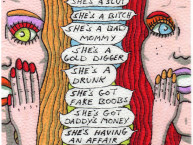 There is very limited research into the effectiveness of couple’s therapy. In fact, there is even a good deal of confusion about what success means. Does it mean that the couple stays together? Does it mean that they separate amicably? Could success for one member be failure for the other? Then there is the question about how long does the “success” last?
There is very limited research into the effectiveness of couple’s therapy. In fact, there is even a good deal of confusion about what success means. Does it mean that the couple stays together? Does it mean that they separate amicably? Could success for one member be failure for the other? Then there is the question about how long does the “success” last?
Even the best reports indicate that the change is limited and wears off quickly over time (here). Others feel that couple’s therapy is almost as likely to make things worse as it is to make things better (here). It can make things worse because it often involves two people who have been saving up their anger and resentments for years before coming into a therapist’s office to unload. The Psychotherapy Networker (a popular professional magazine for therapists) devoted an entire issue to examining the fact that even therapists who specialize in helping couples hate doing it. They often feel defeated, anxious, burned out and hopeless as they put themselves on the firing line between two warring parties who come in with both guns blazing.
Is it helpful for couples to lay out their grievances this way? Is it useful to play “lets make a deal” therapy, in which she promises to do the dishes if he promises to tell her that he loves her more often? We didn’t think so.
When my wife Pam and I were married almost 30 years ago, our relationship almost died before it had begun. At the time we were under a great deal of stress. We had moved, gotten new jobs, gotten married and made a number of other changes as well, and we knew we needed help. As young therapists ourselves we asked around and found the “best” couples therapist around and drove an hour up to see her every week. On our trip up to see her we would be happy and getting along. Then we would meet with her for an hour and fight the whole way home.
As this repeated week after week we started to pull away from each other until one week the therapist told us that we should get divorced. She felt that our differences were too much and that we should divorce now and find other partners.
Luckilly, even though we were just beginner therapists, we knew that there was something wrong with that advice. It felt wrong for a therapist to be making the decision about the future of our relationship. It felt wrong to focus so painfully on what was making us unhappy. And we were smart enough to know that if we abandoned each other we would both carry that scar for the rest of our lives.
As a result we started looking for another way to heal, and what we found turns traditional couple’s therapy on its head. What we found doesn’t focus on what is not working. It doesn’t involve making deals. It doesn’t even involve changing our partner. In fact, what we found turns couple’s therapy into the most powerful tool for personal healing yet discovered!
Couples Coaching
The secret to what we discovered lies in powerful new technologies for trauma healing. Armed with these techniques we are able to address judgments, limiting beliefs, unforgiveness and negative feelings at their source: inside of us.
If you have a negative judgment or feeling related to your partner, it can’t be fixed by changing your partner. It has to be fixed within you by releasing it. If I feel anger at my wife or believe that she doesn’t love me I have to heal that by learning how to release these feelings and judgments within myself. When I do this I get a dual benefit: I feel better and her behavior often magically changes as well. It changes because I am different, not because I gave her an ultimatum.
Couples begin with love in their hearts but this love so often ends up being eaten up by resentment, guilt, anger, fear and judgment. Where do these things come from? They come from inside us. How many people do you know who have been in multiple relationships only to find each one ending with the same bitterness? Often they think they just made a bad choice (or had bad luck) and next time they will do better, but that isn’t the way it works.
Relationship is a discipline.
Relationship shows us those parts of ourselves that we try to hide from others and even from ourselves. If a part of myself feels unloveable or ugly or stupid then I am going to be hyper alert to signs from the environment that confirm these thoughts (and then of course I will be very angry at whoever made me feel that way!). The seeds of our future conflict are built into every relationship from the beginning. The things we most love about our partner (she is loving and communicative, he is strong and protective) becomes what we most resent (she nags and won’t shut up, he is withdrawn and resentful).
Why does this happen? It is because we all have core beliefs about ourselves and the world around us that shape our experience. Most of us can’t see these beliefs because they are so fundamental to our sense of who we are that they are invisible. Once we are in relationship though, our partners can see them, but we don’t know what to do about them. Since we don’t know how to heal them we learn to tiptoe around them and eventually fight about them. Of course that doesn’t do anything but make them stronger. What we have to do is release them. Only then can relationship become a vehicle to personal expansion and ever greater love and connection.
How Does Couple’s Coaching Work?
Pam and I consider what we do with couples to be coaching rather than therapy because we are not trying to fix something that is broken. We are not diagnosing or treating some psychological syndrome. We are engaging with couples who want more than just to stay married. The couples we work with want it all they want to be happy, free, engaged, loving and connected intimately with their partner, and they are willing to let go of their misery, self doubt and smallness in order to get there.
Coaching starts with commitment.
It takes time to make all of the changes necessary to be fully yourself in relationship. When we begin we ask for a six month contract, just as a fitness coach might because it takes time and effort to build the muscles necessary to free yourself from unhappiness.
While we prefer to work with couples, this is not necessary. About a third of the time we only get to work with one person out of the couple, or we start working with individuals who are between relationships and don’t want a repeat of their unhappy relationship cycle. Because the core of coaching is to help each person find and resolve his or her own trauma and limitations, we can begin with whoever is motivated.
Coaching is a positive experience
As soon as we begin, we will help you to form a powerful positive intention of what you desire. We have found that focusing on “staying together” or “getting along” is never enough. We all want more but we focus so much on what we don’t want that we never get our real heart’s desire.
Once you have found your heart’s desire, whether that is within a current relationship, for a future relationship or just for yourself, we help coach you through the process of obtaining it. No matter what your desire is, it is possible for you if you are willing to do the work on yourself.
Once we begin, we will teach you several powerful techniques we have created to quickly and painlessly release feelings, judgments and resentments. These techniques are so simple and effective that you will quickly be able to do them at home and literally transform your day to day interactions. Over time, and working with your coach, you will find and release limiting beliefs, trauma and judgment that you might not have even known was there. You will discover how issues from your childhood invaded and colored your current experience. This won’t be an academic understanding. You will directly experience it as you learn to release whatever doesn’t serve you. You will reclaim not just your relationship, but through your relationship, you will regain parts of your loving, generous nature that you thought you had lost forever.
If you have more questions or if you would like to sign up for a free breakthrough session with Pam, call 609 432-7501







1 comment for “Whats Wrong With Traditional Couple’s Therapy”